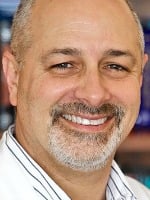 |
| UCSF's Dr. Jeffrey Olgin |
The University of California, San Francisco (UCSF) has snagged $9.75 million to build a platform for the remote collection of research data. UCSF will use the cash to build out its mobile data gathering toolkit, giving it the capabilities to support large-scale, geographically-dispersed research programs.
Funding for the project has come from the National Institutes of Health (NIH), which wants UCSF to use it to create Health ePeople over the next five years. UCSF has some experience with such tasks. The university already has a 30,000-person remote cardiac study up and running--plus ambitions to scale up to 1 million participants--and will use this has the basis for its broader, NIH-backed project. Data from the heart study will feed into Health ePeople, as will the experience of using mobile apps, echocardiogram smartphone cases and portable blood pressure cuffs that UCSF has gained to date.
The goal is to tap into these technologies and skills to create a large, eveready cohort of volunteers that can participate in future remote health research projects. "It will help investigators collect mobile health data via integration with sensors, devices and apps, deliver online surveys, connect with external data sources including electronic health records and use novel methods for ascertaining and adjudicating clinical outcome events," Dr. Jeffrey Olgin, co-principal investigator and chief of cardiology at UCSF, said in a statement.
UCSF will corral other organizations to contribute to the project. A clutch of federal, nonprofit and nongovernmental groups are on its hit list, including the Mobile Sensor Data-to-Knowledge Center of Excellence, Open mHealth, the NIH Precision Medicine Initiative and the National Patient-Centered Clinical Research Network. UCSF also worked with the industry on its earlier cardiac study, which is underpinned by technology from AliveCor, Ginger.io, Qardio and other companies. The task now is to combine such resources into an effective mobile health research platform.
"We plan to develop a spectrum of different options for investigators to use for their research, including full-service, web-based intervention systems to simple data collection 'modules' that can be plugged into existing web resources," Co-Principal Investigator Mark Pletcher said.
- read the release
Related Articles:
California starts statewide precision medicine initiative with Atul Butte at the helm
Early user of Venter's DNA synthesizer reports saving time, money
FDA setting up data, informatics center with UCSF and Stanford